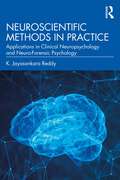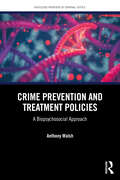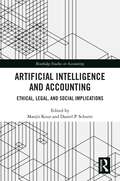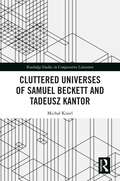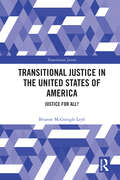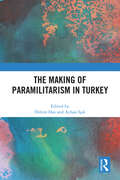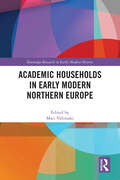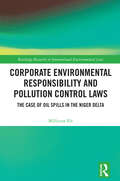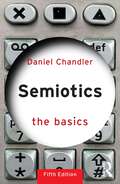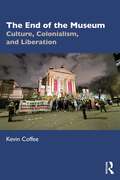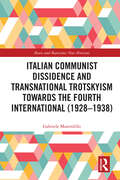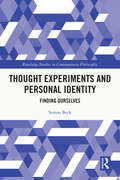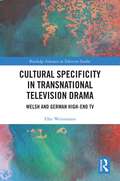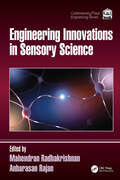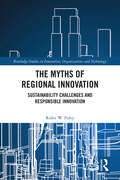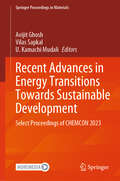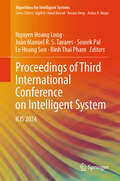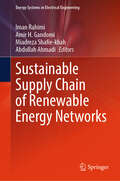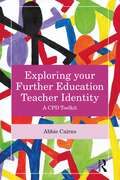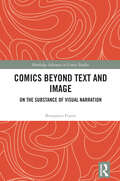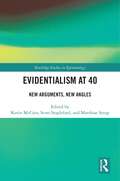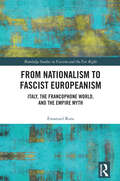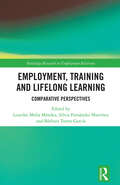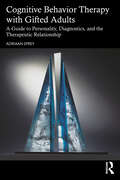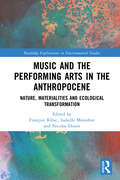- Table View
- List View
Neuroscientific Methods in Practice: Applications in Clinical Neuropsychology and Neuro-Forensic Psychology
by K. Jayasankara ReddyThis book presents an in-depth exploration of the convergence of neuroscience with clinical psychology, clinical neuropsychology, and forensic psychology, examining advanced methodologies, practical applications, and real-world case studies.K. Jayasankara Reddy provides a thorough examination of state-of-the-art neuroscientific methods and the revolutionary effects on both diagnosis and forensic inquiry. Reddy highlights the transformative impact of neuroimaging, neurophysiology, neuroelectrophysiology, and genetic analysis on our comprehension of brain function and behavior, using compelling case examples and empirical evidence. This book not only discusses methods but also critically examines ethical difficulties, merits, and challenges of the techniques, as well as the legal ramifications that may arise from the use of neuroscientific evidence in clinical and forensic settings. This book also highlights the need for a sophisticated comprehension of privacy issues, patient self-governance, and the use of neurobiological information within legal structures.Overall, it provides readers with the tools to negotiate complicated ethical landscapes while responsibly utilizing neuroscientific discoveries, advocating for a balanced approach that combines scientific rigor and ethical responsibility. This volume is an important resource for students, researchers, and practitioners of clinical neuropsychology, forensic psychology, and neuroscience.
Crime Prevention and Treatment Policies: A Biopsychosocial Approach (Routledge Frontiers of Criminal Justice)
by Anthony WalshThis book shows how to use biopsychosocial assessment for crime prevention and to achieve more individualized treatment for those who commit crimes. Author Anthony Walsh, a prominent figure in biosocial criminology for more than four decades, examines the treatment policy recommendations of major criminological theories and how they might be improved by integrating relevant biopsychosocial insights. Walsh contends that sound crime prevention and treatment policies must be based on empirical evidence derived from theories about the causes of crime if they are to reduce incarceration rates. The biopsychosocial perspective improves on traditional theories by examining all putative causes of crime from the micro to the macro— from neurons to neighborhoods— and should thus improve prevention and treatment efforts.The understanding of the genetic, neurobiological, and physiological components of antisocial behavior has improved exponentially over the past three decades. The relevant biological measures (e.g., genotyping, hormone assays, autonomic system arousal levels, resting heart rates) are routinely examined in university labs for research purposes. This book shows how measures of these components can be fruitfully integrated into the risk- need- responsivity model of offender treatment.Offering a fresh perspective, this book is essential for both scholars and practitioners wishing to explore treatment modalities that consider the biological aspects of criminality.
Artificial Intelligence and Accounting: Ethical, Legal, and Social Implications (Routledge Studies in Accounting)
by Manjit Kour Daniel P. SchutteIn the dynamic field of accounting, where accuracy and productivity are critical, artificial intelligence (AI) integration has become a game-changer and AI is set to affect every industry. With the speed at which technology is developing, a thorough manual that helps readers understand the complex world of AI in accounting is desperately needed. By offering a sophisticated grasp of how AI is changing the core ideas of accounting and financial management, this book bridges this knowledge gap. It explores the relationship between AI technology and accounting processes, revealing the significant influence and unrealised potential outside of traditional bookkeeping.This book delves into how AI is revolutionising accounting procedures. It explores the newest AI technologies and their uses in financial data processing, auditing, compliance, and forecasting, ranging from machine learning to predictive analytics. It ensures responsible AI integration by addressing biases, accountability, and transparency while emphasising ethical considerations. This book provides case studies, practical advice, and examples from the real world, guaranteeing that readers not only understand the theoretical foundations of AI in accounting but also get the knowledge necessary to apply and maximise these technologies within their professional domains by connecting theory and application. It offers a road map for traversing the accounting industry's AI frontier, from using predictive analytics to make well-informed decisions to automating repetitive activities.This book will enable accountants, auditors, and financial analysts to prosper in the emerging AI-driven world.
Cluttered Universes of Samuel Beckett and Tadeusz Kantor (Routledge Studies in Comparative Literature)
by Michał KisielCluttered Universes of Samuel Beckett and Tadeusz Kantor is a collection of four essays bringing Kantor’s and Beckett’s texts, theatres, and theories into conversation with deconstruction, new materialism, environmental humanities, and posthumanism. This book is dedicated to two artists rarely discussed together to see how their awareness of poetics and performativity of matter might help us understand our connection to the material world, even if the world is falling apart. Jane Bennett, Karen Barad, Rosi Braidotti, Donna Haraway, Timothy Morton, and others pave the way for new critical interpretations of canonical works, which are recognised as universes “cluttered” with matter, objects, things, and other nonhuman visitors of seemingly exclusive human domains. Kisiel shows that Beckett’s and Kantor’s carefulness and care for imagining nonhuman/human relationships might refresh our understanding of memory, togetherness, death, or even the end of the world for the Anthropocene.
Transitional Justice in the United States of America: Justice for All? (Transitional Justice)
by Brianne McGonigle LeyhThis book employs a transitional justice lens in order to explore justice initiatives in the United States of America.Transitional justice developed out of societal demands to better address serious abuse, injustice, and atrocities – initially in South American post-authoritarian contexts transitioning to democratic states and later elsewhere, but especially within post-conflict contexts. The lens of transitional justice has only rarely been extended to the United States and never in a comprehensive way. This book aims to provide a contemporary and critical analysis of relevant developments and debates within the United States related to transitional justice. Using the framework of the five main ‘pillars’ of transitional justice – truth, reparation, accountability, guarantee of non-repetition, and memory – the book identifies and explores relevant justice initiatives, both historical and contemporary, across federal, state, and local levels in the United States. The empirical examples taken up show how a broad array of civil society actors are driving transitional justice processes across the country. By recognizing both extraordinary and ordinary justice processes as transitional justice, the book offers a broader understanding of how groups navigate transitions to more democratic, peaceful, and socially just societies. The examples further shed light on the expansion of the field to nontraditional contexts, the relationship between global norms and local practices, and the role of law and political compromise. The book concludes by emphasizing the value and power of the plurality of initiatives taking shape across the United States but calls for a more coherent transitional justice policy at the national level.This book is relevant for scholars and students with interests in transitional justice, conflict resolution, human rights, Indigenous studies, culture, and race.
The Making of Paramilitarism in Turkey
by Özlem Has Ayhan IşıkThis edited volume explores the history and evolution of Turkish paramilitarism from the late Ottoman period to the 2010s. Aimed at undergraduates, postgraduates, scholars, and non-specialists, it offers an interdisciplinary analysis of paramilitary forces’ influence on Turkey’s historical, political, social, legal, and visual landscapes. The book examines key issues such as the Armenian Genocide, anti-communist operations, Alevi pogroms, and anti-Kurdish violence, and delves into how state-sponsored paramilitary groups have shaped the nation’s modern history. Through case studies, examining key paramilitary groups such as Grey Wolves, Village Guards, and JİTEM, contributors reveal the deep-seated connections between paramilitarism and statecraft in Turkey.With a unique focus on the suppression of marginalised groups, including Armenians, Kurds, and Alevis, the book presents groundbreaking research on how paramilitarism has been instrumental in state violence, both domestically and internationally. By incorporating political, economic, and social dimensions, this volume offers a fresh perspective on the enduring role of paramilitary actors in shaping Turkish state policies and provides readers with a comprehensive understanding of the complex dynamics behind informal violence in Turkey’s history.
Academic Households in Early Modern Northern Europe (Routledge Research in Early Modern History)
by Välimäki, Edited by MariThis volume explores academic households in early modern (c. sixteenth to eighteenth century) Northern Europe, examining changing dynamics of family and gender.During the Middle Ages, Christian scholars were expected to spend their lives unwed and instead focus on educating the young. However, a gradual easing of prohibitions against the marriage of scholars began in different areas of Europe in the late fourteenth century. By the end of the sixteenth century, a great number of professors were men with families and establishing their own households. This was especially the case in the German-speaking Protestant areas of Europe and the Swedish realm from the first half of the seventeenth century. The contributors of this volume concentrate on universities that took on the new idealised understanding of professors and other members of academic communities as married men. They analyse how professors and other members of the academic communities viewed family and household, what academic family life was like, and how the members of the academic community utilised family and the household for (academic) self-fashioning and building networks. Furthermore, they pay special attention to the wives and widows of professors and other academics and discuss the agency of these women.This book is an excellent resource for students and professional readers alike who are interested in the histories of early modern universities, families, and gender.
Corporate Environmental Responsibility and Pollution Control Laws: The Case of Oil Spills in the Niger Delta (Routledge Research in International Environmental Law)
by Millicent EleThis book critically examines the corporate environmental responsibility of major oil companies operating in Nigeria’s Niger Delta, focusing on oil spills and comparing regulatory frameworks in Nigeria, the US, the UK, and the EU. It provides a theoretical foundation for holding these companies to the same environmental standards in Nigeria as they adhere to in more advanced jurisdictions.Analysing Shell’s oil spill environmental performance data, the book assesses how its operations in Nigeria compare with global performance figures. Additionally, it evaluates Nigerian environmental laws, highlighting deficiencies that may contribute to persistent oil pollution. Furthermore, it explores issues of regulatory capture, corporate environmental crime, and the transnational litigation of Nigerian oil spill cases in the US, the UK, and the EU. The Petroleum Industry Act (PIA) 2021 is comprehensively assessed in the context of corporate environmental governance and oil pollution control.To propose solutions, the book examines legal frameworks for strengthening corporate due diligence and accountability. It advocates for a robust legal regime to address the clean-up liability of pre-existing (stale) oil spills in the Niger Delta, drawing insights from the UK/EU laws on contaminated land, the US Comprehensive Environmental Response, Compensation, and Liability Act (CERCLA or the Superfund), and the UK laws on oil infrastructure decommissioning. Additionally, the book introduces a novel failure to prevent oil spill offence in Nigeria, an omission-based liability inspired by the UK Bribery Act 2010 and the UK Criminal Finances Act 2017.This book will be of interest to researchers and practitioners in the field of environmental law, pollution, and land law.
Semiotics: The Basics (The Basics)
by Daniel ChandlerThis fifth edition of the bestselling textbook is a major new revision, continuing to provide a concise introduction to the key concepts of semiotics in accessible and jargon-free language.Demystifying what is a complex, highly interdisciplinary field, key questions covered include: What are signs and codes? What can semiotics teach us about representation and reality? What tools does it offer for analysing texts and cultural practices? Semiotics: The Basics focuses on its application to communication and cultural studies. The latest edition features a greatly extended treatment of core concepts, in particular traditional historical models of the sign, the semiotic triangle, and distinctions between ‘natural’ and conventional signs. There is also a greater emphasis on ‘the social life of signs’.With an extensive index, a comprehensive glossary, suggestions for review and for further reading, and a list of online resources, this must-have guide is both the ideal introductory text and an essential reference for students of language, communication, media, and cultural studies at both undergraduate and postgraduate levels.
The End of the Museum: Culture, Colonialism and Liberation
by Kevin CoffeeThis provocative book challenges frequently voiced assertions regarding museums as necessary and valued modern institutions. It raises fundamental, existential questions about contemporary museums as products of the modern colonial world order.Drawing on practical examples of collecting and exhibiting, theoretical research, and critique from diverse countries across the globe, including Chile, India, Korea, the Netherlands, Nigeria, Palestine, Portugal, Sri Lanka and the United States, this book moves beyond the conventional Eurocentric museological framework. This book synthesizes contemporary critiques of museums, while arguing that societies need the sociocultural examinations that museums are capable of facilitating and that radical transformations of "the museum" are fraught with difficulty, but also possible and necessary. Ultimately, Coffee argues that museums can only be future orientated if they are transformed into agents of social justice and inclusion, divestors of illicit collections, and proponents of a liberatory ethic, opposing neo-colonialism in all of its forms. During that transformative process, as this book demonstrates, museum practice and museum theory must also be transformed.The End of the Museum: Culture, Colonialism, and Liberation will appeal to students, researchers, and practitioners interested in a critical examination of museum work and theory.
Italian Communist Dissidence and Transnational Trotskyism towards the Fourth International (Marx and Marxisms)
by Gabriele MastrolilloFollowing his expulsion from the Soviet Union in 1929, Leon Trotsky promoted the birth of an International Anti-Stalinist Communist movement which considered itself in opposition to the Communist International (Comintern). However, since 1933, it began to regard itself as an independent transnational organization in direct competition with the Comintern. Italian Communist Dissidence and Transnational Trotskyism towards the Fourth International (1928–1938) draws from wide-ranging primary and secondary sources, most of which are unpublished, to tell the fascinating unexplored story of the relations between the Italian communist dissidence (Trotskyist and Bordigists), Trotsky, and the International Secretariat (IS), the leading structure of the Trotskyist movement in the 1930s. It focuses on the role played by the two most notable executives of Italian dissident communism, Alfonso Leonetti and Pietro Tresso, who performed key roles inside the IS; consequently, the study of their activity gives us the possibility of following the development of Transnational Trotskyism in the 1930s until the establishment of the Fourth International. Written for scholars of Italian and International Communism, this book will also appeal to those interested in learning how Italian Trotskyism contributed to the building of a global alternative to Stalinism.
Thought Experiments and Personal Identity: Finding Ourselves (Routledge Studies in Contemporary Philosophy)
by Simon BeckThis book provides an essential, comprehensive discussion on thought experiments and how they have featured throughout the history of the personal identity debate in analytic philosophy.Although many philosophical arguments employ thought experiments as a valuable methodological tool, there is a lack of focused discussion on the significant role these experiments play in the personal identity debate specifically. This book covers a range of central theories and examines how thought experiments have been featured throughout each. The author discusses and responds to pivotal works on personal identity such as John Locke’s Essay Concerning Human Understanding, Derek Parfit’s Reasons and Persons, as well as more recent arguments in the discussion. The book also explores how thought experiments are used for related debates in other philosophical traditions.Thought Experiments and Personal Identity will be of interest to scholars and advanced students working in contemporary philosophy of mind and metaphysics, as well as those with an interest in philosophical methodology.
Cultural Specificity in Transnational Television Drama: Welsh and German High-End TV (Routledge Advances in Television Studies)
by Elke WeissmannCultural Specificity in Transnational Television Drama examines two European television industries: those of Germany and Wales.This book analyses how near‑global shifts towards the fragmentation of audiences, the convergence of media and the transnationalisation of the television industries impact in culturally specific ways. It shows that these larger developments in the industries intersect with specific local histories and cultures, which influence how the changes are experienced and what kind of stories they lead to. Offering a comparative cultural analysis of these two industries and their output, and drawing on a variety of methods which include interviews, analysis of published interviews in the trade and other press, some archival research and textual analysis, this book shows that the global shifts in television impact in locally specific ways, which implies a continuation and indeed exaggeration of existing cultural differences at the same time as we see increasing collaboration, internationalisation and, as a result, also homogenisation between nations.This book presents a unique emphasis on both transnationalising and localising tendencies, highlighting the need to maintain analytical focus on the nation in this supposedly post‑national world. It will be of particular interest to scholars and researchers in contemporary television landscape, literary and film studies, modern languages, philosophy and economics.
Engineering Innovations in Sensory Science (Contemporary Food Engineering)
by Mahendran Radhakrishnan Anbarasan RajanSensory analysis is significant in food product development, and its importance impacts the maintenance of sensory qualities for food products. While there are many books exploring sensory analysis and its methods, this is the first of its kind to also explore the use of engineering tools and instruments to produce measurable and reliable data. In exploring sensory analysis methods, this book also focuses on the novel computer interface technologies to retrieve human sensory perceptions directly from the human body and convert them into a measurable unit, exploring the present status in computer interface technologies and scope for interventions to overcome obstacles.Mahendran Radhakrishnan attained his PhD in Food Process Engineering from Tamil Nadu Agricultural University, India. Prior to this, he received degrees in Industrial Biotechnology as well as Chemical Engineering. He is presently Professor and Head of Department of Food Process Technology at National Institute of Food Technology, Entrepreneurship and Management, Thanjavur (NIFTEM-T). Dr. Mahendran’s research focus includes Advances in Food Processing Technologies, novel non-thermal processing, including Cold Plasma, High Pressure Processing Applications in Agri-Food, Food Structure & Shape Transformation (4D Printing), and Super Critical CO2 Extraction. Mahendran has authored over 150 publications in reputed journals.Anbarasan Rajan is Food Process Engineer who earned his M.Tech and Ph.D. in Food Process Engineering from the National Institute of Food Technology, Entrepreneurship and Management, Thanjavur (NIFTEM-T). His primary research areas include nonthermal food processing, 4D foods/food shape morphing, and sensory science.
The Myths of Regional Innovation: Sustainability Challenges and Responsible Innovation (Routledge Studies in Innovation, Organizations and Technology)
by Rider W. FoleyBillions of dollars, Euros, yen, and yuan in public funds are spent annually to promote innovation in metropolitan regions, attempting to transform the economy by attracting technology-based companies and supporting small startups to secure high-paying jobs. The impacts of those investments are typically assessed in terms of economic growth, venture capital, and jobs. Regional innovation is assessed with financial measures that do not account for the distribution of wealth, nor do they evaluate if innovation addresses broader sustainability concerns. This book draws on evidence from 144 interviews with civic leaders in three urban regions—Atlanta, Phoenix, and the Twin Cities—to illuminate three commonly accepted but flawed myths about innovation that misdirect policymakers and civic leaders and perpetuate the idea that innovation is solely about economic growth. This book offers evidence of the social networks, labor divisions, and conditions enabling innovation to dispel those three myths and propose more nuanced and realistic ways of thinking about regional innovation.This book is not an argument against innovation. Rather, it critically reflects upon investments in innovation and showcases laudable efforts to create a livable and sustainable city. The book offers a novel method to assess the processes and outcomes of innovation in a manner that can complement economic approaches. The author lays bare the human values that motivate city staff, corporate officers, and academic partners and highlights the efforts of organizations that often remain underappreciated. The evidence presented in this book puts forward a means to assess if (and how) innovation contributes to an equitable and sustainable future or if it perpetuates injustices and economic stratification.The Myths of Regional Innovation will appeal to scholars across broad fields, including innovation studies, technology management, entrepreneurship, economic development, and public policy.
Recent Advances in Energy Transitions Towards Sustainable Development: Select Proceedings of CHEMCON 2023 (Springer Proceedings in Materials #67)
by U. Kamachi Mudali Avijit Ghosh Vilas SapkalThis book presents the select proceedings of the 76th Indian Chemical Engineering Congress (CHEMCON–2023) which was focused on energy transitions towards sustainable development. It includes the latest developments in the energy science and engineering towards sustainable development. It also discusses the role of machine learning & IoT in chemical engineering. Various topics covered include chemical engineering, process engineering, biofuel and biosafety, advanced techniques for waste-to-wealth generation, bioinformatics for energy transition, green and renewable membranes and carbon capture sequestration and utilization, electrochemical energy, biodiesel and bioplastics toward low-carbon footprint and sustainable food packaging. The book will be a valuable reference for researchers and professionals interested in sustainable energy and allied fields.
Proceedings of Third International Conference on Intelligent System: ICIS 2024 (Algorithms for Intelligent Systems)
by João Manuel R. S. Tavares Souvik Pal Le Hoang Son Binh Thai Pham Nguyen Hoang LongThis book gathers selected high-quality research papers presented at the Third International Conference on Intelligent System (ICIS 2024), organized by University of Transport Technology, Hanoi, Vietnam, during 24–25 October 2024. It discusses high-quality and cutting-edge research in the areas of informatics, intelligent systems, and smart technologies and applications. The book is a collection of the latest research articles in intelligent control, artificial intelligence, neural networks, knowledge discovery, decision support systems, soft computing, data mining, and ontologies, machine learning, intelligent measurement, and other related fields.
Sustainable Supply Chain of Renewable Energy Networks (Energy Systems in Electrical Engineering)
by Amir H. Gandomi Iman Rahimi Miadreza Shafie-Khah Abdollah AhmadiThis book examines the sustainable supply chain of renewable energy networks, combining global perspectives with engineering optimization. As the world shifts toward eco-friendly energy sources, it brings together experts to share best practices in solar, wind, marine, and biomass energy. The book covers innovative methodologies, real-world case studies, and aligns with the United Nations' Sustainable Development Goals. It serves as a vital resource for researchers, policymakers, and industry leaders. Additionally, students and educators will find it valuable for courses on sustainable energy systems, environmental policy, and renewable energy technologies. Whether for research, policy development, or education, this book is essential for understanding the evolving landscape of sustainable energy.
Exploring your Further Education Teacher Identity: A CPD Toolkit
by Abbie CairnsOffering a new approach for further education (FE) and vocational educators, this practical guide provides the tools and techniques necessary to trace and map professional identities and consider how these evolve and recognise continuing professional development needs.Exploring the theoretical grounding and key tools in the form of Likert scales and networks of enterprises, this practical guide is packed full of useful tips and case studies that illustrate the practical applications of the tools and the benefits of using them. With key examples drawn from FE and vocational teachers working across the sector, this book is designed to provide insight and CPD guidance for anyone grappling with two or more professional identities. In a changing professional landscape where teachers are expected to fulfill multiple roles simultaneously, this book has the power to reshape how teachers reflect on their dual or multifaceted identities.Exploring your Further Education Teacher Identity is essential reading for vocational FE teachers and their managers, trainee teachers, and teacher educators who want to better understand their professional identities and feel more in control of where they position themselves.
Comics Beyond Text and Image: On the Substance of Visual Narration (Routledge Advances in Comics Studies)
by Benjamin FraserComics Beyond Text and Image conceptualizes comics as “bodies,” exploring the substance and the many movements and expressions of comics first and foremost in terms of corporeality.The book centers on the metaphor of the comics body as a way of opening up our understandings of what comics do. It begins from the position that narrative in comics is corporeal, expressed in and through the visual bodies into which the page can be divided analytically, and from the interaction of the human body with the comics body. Drawing on the philosophy of Baruch Spinoza, the author argues for the primary role of visual narration over textual narration, develops a theory of the comics text as a cohesive and variegated cartography, and shows how thought is expressed in the extensive space of the comics page. This theory is then applied in snapshots of individual comics works that each in their own way continue the philosophical discussions of embodiment.This book moves beyond traditional modes of narration or narrative and will appeal to students and scholars of comics studies, as well as to those thinking about visual narrative more broadly, and to scholars of Spinoza and Deleuze.
Evidentialism at 40: New Arguments, New Angles (Routledge Studies in Epistemology)
by Matthias Steup Kevin McCain Scott StaplefordThis volume presents state-of-the-art research on issues related to evidentialism. It demonstrates the continuing relevance of evidentialist epistemology by bringing it into direct confrontation with some of its latest non-evidentialist rivals and by proposing new areas for exploration and development.Conee and Feldman’s landmark paper “Evidentialism” (1985) served as a launching point for an enormous research program in epistemology. Many epistemologists define their points of view at least partly in terms of how they relate to evidentialism. The chapters in this volume address important questions related to evidentialism, including: How should ‘evidentialism’ be defined? When does evidence suffice for belief? What does properly or appropriately responding to one’s evidence involve? Does evidentialism capture all cases of epistemically justified believing? Is there any kind of epistemic normativity that falls outside the purview of evidentialist epistemology? Are core evidentialist theses compatible with certain forms of externalism? Do classical evidentialist theses successfully preclude pragmatism? Do moral considerations ever get a say in what it is rational to believe? What (more) should evidentialists say about suspending judgment? What is the connection between evidence and logical inference? What should evidentialists say about extended memory? Does public evidence matter to epistemic justification? The range of fresh ideas in this cutting-edge volume, marking the 40th anniversary of “Evidentialism”, will appeal to scholars and graduate students working on evidentialism, evidence, the nature of justification, evidential support, and related topics in epistemology.
From Nationalism to Fascist Europeanism: Italy, the Francophone World, and the Empire Myth (Routledge Studies in Fascism and the Far Right)
by Emanuel RotaThis book traces the intellectual history of fascist Europeanism, examining how Italian and Francophone fascist thinkers envisioned European unity as a means of consolidating power, overcoming nationalist divisions, and resisting external threats rather than promoting peace or democracy.Readers will discover how fascist thinkers—from Mussolini and Drieu La Rochelle to Evola, Thiriart, and Romualdi—reimagined European unity as a radical alternative to liberal democracy, driven by visions of power, hierarchy, and racial identity. By exploring pivotal debates on nationalism, modernity, and empire, this book reveals the hidden ideological struggles within fascist Europeanism and their enduring legacy in today’s far-right movements. Richly grounded in historical analysis and original sources, it provides a provocative new perspective on European integration as an ongoing political battleground.This book is intended for scholars, researchers, and students of modern European history, fascism, and political ideologies. It will also be of interest to those studying contemporary far-right movements and the historical roots of European integration.
Employment, Training and Lifelong Learning: Comparative Perspectives (Routledge Research in Employment Relations)
by Lourdes Mella Méndez Silvia Fernández Martínez Bárbara Torres GarcíaThis book offers a timely exploration of the continuous training of individuals, a subject crucial to both business competitiveness and societal progress in today’s rapidly changing world. Addressing the digital and climate revolutions, it examines how lifelong learning helps workers adapt their skills to meet evolving demands while supporting active ageing for all citizens, even in retirement.Divided into three sections, the book features studies that combine theoretical insights and practical recommendations from renowned experts in education and law. The book stands out for its international scope, with chapters covering diverse national perspectives from countries such as the United Kingdom, the United States, Japan and various European nations. It uniquely integrates both education and legal perspectives, providing a comprehensive analysis that addresses gaps in existing literature. Readers will benefit from clear, accessible language, proposals for key stakeholders (e.g., policymakers, social partners), and coverage of pressing issues like vocational training for immigrants, legal frameworks for non-formal learning and the impact of digital transitions on workforce development.This book is an essential resource for academics, researchers, advanced students, legal professionals, educators, policymakers, trade unions, and employer associations. It offers valuable insights for anyone involved in Labour Law, social security, vocational training or workforce development on a global scale.
Cognitive Behavior Therapy with Gifted Adults: A Guide to Personality, Diagnostics, and the Therapeutic Relationship
by Adriaan SpreyThis book presents a cognitive behavior approach to therapy with gifted adults, providing insight into and offering practical tools for diagnosing and working with the often unseen and unrecognized problems of these clients.The book starts with a systematic outline of practical screening for giftedness and diagnosis of specific personality traits, discussing the common traits of giftedness along with the visible and invisible strengths and downsides of the diagnosis. It then offers a practical cognitive behavioral model for working with clients to understand and improve self-image, high sensitivity, creative stagnation, and interactional problems. Readers will learn how to create a case conceptualization, functional analysis, and treatment plan, as well as how to adapt goals and techniques for and with one’s client. Specific attention is given to potential pitfalls and dysfunctions in the therapeutic relationship, and tools are provided to help the therapist specifically analyze and manage these. Practical case studies illustrate the methodology and provide further clarity for the reader.The book will help any psychotherapist and mental-health-care professional to better support, work with and help gifted adults in their professional practice.
Music and the Performing Arts in the Anthropocene: Nature, Materialities and Ecological Transformation (Routledge Explorations in Environmental Studies)
by François Ribac Isabelle Moindrot Nicolas DoninMusic and the Performing Arts in the Anthropocene offers a series of thought-provoking chapters about music and the performing arts viewed from current Anthropocene-aware perspectives. From the use of gas, water and air in 19th-century stage practices to the ecology of musical instruments and sound reproduction technologies, waste and carbon print in experimental music and theatrical production, knowledge of precariousness and empowerment through music in a changing world, each chapter aims at highlighting an issue that has always been here but never looked at thoroughly, due to the divides and hierarchies of the modern cosmogony.Gathering 16 scholars from a variety of disciplinary backgrounds (history of literature, opera and theatre studies, musicology, sound studies, sociology, information science, etc.), this volume reflects on the relationships between the performing arts, music and environmental issues. It also explores a number of tools for changes and sketches how we will understand the arts, their history and their future beyond ecocriticism.This book will be of great interest to students and scholars in the humanities and social sciences, as well as a broader readership involved in art and environment policies.
